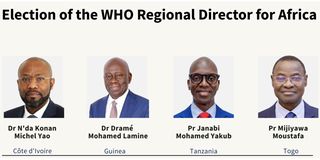Tanzania banks on Prof Janabi as WHO decides on its Africa Director

What you need to know:
- The election follows the tragic and untimely death of Regional Director-elect Dr Faustine Ndugulile in November 2024. In response, the WHO Regional Committee for Africa convened a virtual special session in January 2025, agreeing to an expedited process to nominate and appoint a new regional director.
Dar es Salaam. All eyes are on Geneva ahead of a pivotal vote scheduled for today (Sunday, 18 May 2025), as the World Health Organization (WHO) prepares to elect its new Regional Director for Africa.
Tanzania’s candidate, Prof Mohamed Janabi, is in the running after weeks of high-level diplomatic lobbying.
The election follows the tragic and untimely death of Regional Director-elect Dr Faustine Ndugulile in November 2024. In response, the WHO Regional Committee for Africa convened a virtual special session in January 2025, agreeing to an expedited process to nominate and appoint a new regional director.
Nominations closed in February, and the five shortlisted candidates, including Prof Janabi, participated in a live virtual candidates’ forum on 2 April 2025.
Prof Janabi, a respected cardiologist and the current Executive Director of Muhimbili National Hospital (MNH), has emerged as a formidable contender in the race. His campaign, spearheaded by the Tanzanian government, has gained traction across the continent, with Tanzanian embassies and health stakeholders actively lobbying for regional backing.
During the virtual forum, Prof Janabi presented a compelling five-year vision for the region, drawing on a wealth of experience that spans decades of medical leadership. As the founding CEO of the Jakaya Kikwete Cardiac Institute, he oversaw a dramatic 95 percent reduction in overseas medical referrals, redirecting savings into strengthening primary healthcare in Tanzania.
At the MNH, he manages one of Africa’s largest hospitals and has led innovative outreach through a network of over 12,000 satellite facilities, integrating telemedicine and AI to expand access to care.
He also brokered a $363 million health systems funding deal with the Republic of Korea, negotiated under favourable terms. These accomplishments have positioned Prof Janabi not only as a healthcare reformist but also as a strategic thinker with a proven record in mobilising resources and enhancing institutional capacity.
His message during the forum was clear: Africa’s future health depends on innovative, inclusive, and resilient systems. Drawing from experiences such as his advisory role during the Ebola outbreak in West Africa and leading public health advocacy campaigns in HIV and Covid-19, Prof Janabi articulated a vision for a stronger WHO Africa office capable of confronting both emerging and persistent health challenges.
Speaking in March, Health Minister Jenista Mhagama, outlined four key factors underpinning Tanzania’s strong bid — including the country’s elevated diplomatic profile under President Samia Suluhu Hassan, its track record of producing strong regional leaders, Prof Janabi’s expertise in health financing, and his extensive management experience in public health systems.
Prof Janabi faces strong competition from four other candidates: Prof Moustafa Mijiyawa of Togo, Dr N’da Konan Michel Yao of Côte d’Ivoire, and Mohamed Lamine Drame of Guinea. While the race remains wide open, Tanzania’s vigorous campaign has elevated Prof Janabi’s profile as a frontrunner with both technical expertise and regional support.
The upcoming vote in Geneva will be conducted by secret ballot in a closed session. The successful candidate will be nominated by the Regional Committee for Africa and formally appointed by the WHO Executive Board. The position carries a five-year term, renewable once.


